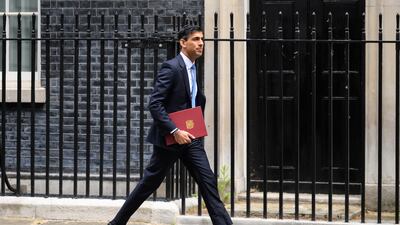Britain introduced a 25 per cent temporary tax on energy companies' profits on Thursday as the government sought to raise funds for special household payments to offset the rising cost of utility bills.
Rishi Sunak, the chancellor, told MPs that the move would raise £5 billion ($6.29bn) in a year and would last as long as global oil and gas prices stay elevated.
"The oil and gas sector is making extraordinary profits, not as a result of recent changes to risk taking or innovation or efficiency, but as a result of surging global commodity prices, driven in part by Russia's invasion of Ukraine," he said.
"It is possible to both tax extraordinary profits fairly and incentivise investment. And so like previous governments including Conservative ones, we will introduce a temporary targeted energy profits levy."
The finance minister said a record number of components of the inflation measure were showing unprecedented increases as "core” price increases become broader based.
To support parts of the community the government will send 8.4 million households lump-sum payments worth up to £650 on top of £400 discounts on energy bills. The round of new payments alone would cost £5bn and was accompanied by more support for pensioners and people with special needs.

The package worth £15 billion ($19 billion), funded in part by the exceptional levy on soaring profits enjoyed by the likes of BP and Shell, brings the full cost of addressing the crisis almost equivalent to the 2 per cent of GDP the UK spends on defence.
"That means we are supporting families with the cost of living with £37b, or one and a half percent of GDP," said Mr Sunak.
"We have a collective responsibility to help those who are paying the highest price for the high inflation we face. That is why I’m targeting this significant support to millions of the most vulnerable people in our society. I said we would stand by people and that is what this support does today."
Global gas prices soared last year when the reopening of world economies from pandemic lockdowns caused demand to return sharply and supply could not keep up. The war in Ukraine has pushed up prices further in 2022.
The government has previously said it is opposed to a windfall tax on energy suppliers because it would deter them from investing in new energy projects.
But that position has shifted as political pressure for action has mounted, with the highest inflation among G7 nations and rising bills pushing many household budgets to the limit.
The opposition Labour Party campaigned for a windfall tax on oil and gas companies to raise about £2bn while the chancellor said his tax grab would bring in more.
The concept of so-called windfall taxes is not new in the UK nor in response to the European energy crisis. Conservative prime minister Margaret Thatcher's finance minister Geoffrey Howe imposed a windfall tax on banks that made excess profits, having been largely protected from the effects of recession. It charged 2.5 per cent of their non-interest bearing current account deposits to raise about £400m.
A special tax, known as the Supplementary Petroleum Duty, was levied on North Sea oil and gas companies that benefited from soaring oil prices. It was levied on gross revenues rather than profit, at 20 per cent. It was withdrawn after two years.

Labour prime minister Tony Blair's government imposed a levy on the excess profits of privatised utility companies, which it argued had been undervalued when sold off by the Conservative government. It charged 23 per cent of the difference between the value at which the companies were floated and their current value based on their profits since. The windfall tax was estimated to have raised £5.2bn and the money was used to fund a programme to help people off welfare and into work.
Spain in September passed emergency measures to reduce high energy bills by redirecting billions of euros in extraordinary profits from energy companies to consumers via a windfall tax, with the government expecting to channel about €2.6bn ($2.78bn) from energy companies to households over six months.
Italy introduced a 10 per cent one-off levy on producers and sellers of electricity, natural gas and petrol products in May and said would be raised to 25 per cent to help consumers and businesses cope with surging energy costs.
Mr Sunak also issued a warning to the electricity generation sector – where extraordinary profits are also being made due to the impact that rising gas prices have on the price paid for electricity in the UK market. Officials were consulting with power generation sector and investors to agree reforms that ensured that the price paid for electricity is more reflective of the costs of production.


